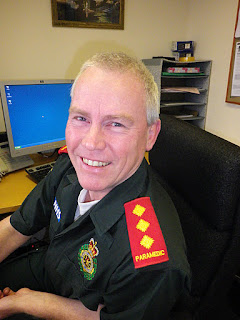
JEFF 'Jeffers' Jones is an Emergency Care Practitioner (ECP) paramedic who works at Weymouth ambulance station for South Western Ambulance Service NHS Foundation Trust (SWASFT).
With more than 12 years of frontline experience, Jeff is no stranger to shift work and this year he was on duty responding to emergency calls throughout West Dorset over the Christmas and New Year holidays.
Having spent most of his life living and working in Weymouth, Jeff has given up a lot of his spare time helping people through a range of charity fundraising events.
Most recently he and his ambulance colleagues at Weymouth Station made a donation to a local children’s charity as a gesture of seasonal goodwill.
Here Jeff talks about his work, his fundraising achievements and what it takes to become a frontline ambulance worker.
MOST people have some idea of what a paramedic does, but what is an ECP?
An ECP has all the skills of a paramedic, plus extended training in medical conditions. So, we can help the doctors with home visits and therefore help to give patients the most appropriate care instead of making unnecessary admissions to accident and emergency departments. An ECP can also admit patients directly to a hospital ward, unlike ambulance paramedics who can only take people to A&E, which isn’t always appropriate or essential.
HOW does your role differ from a paramedic’s on a day to day basis?
It differs mostly on weekends and nights. At weekends the ECP works for the out of hours doctors service. In West Dorset there is a doctor based at Dorchester or Weymouth and they triage calls so we can go out and deal with those patients. Of course, we still attend life threatening call outs for the ambulance service. So, if a doctor has asked us to visit a patient with a chest infection, for example, and then an emergency comes in, we will go and attend the emergency first.
HOW did you end up being an ECP?
SWASFT started the ECP role about seven-years-ago. I was already a paramedic at that time so I just applied for it. I’ve been in the ambulance service for 12 years and before that I was in an industrial Fire and Ambulance service for 10 years. As well as being an ECP I also now have the added duties of being a Clinical Support Officer, which means I’m one of the station managers at Weymouth.
BESIDES the job, you have also been involved in a fair amount of charity work, is that right?
Yes, in the last five years I’ve helped raise around £14,000 doing a few different events. The first was for a little boy I went to where I was on my own for 20/30 minutes when he went into cardiac arrest and I had to revive him. He suffered some brain damage from further arrests in hospital and so I helped some local people raise some money for him by doing a sponsored kayak up the Fleet. That involved getting permission from the Army to paddle past the firing ranges, which is quite a feat in itself. Not everyone can canoe the whole length of the Fleet. The second major charity event was due to a colleague I used to teach at the local swimming club who died of liver cancer. I raised some money for the Weldmar Hospice through a 24hour swim and we raised £7,500. Just recently, at Weymouth station, we were donated some prize money that we received from SWASFT for being the most improved station in Dorset. We didn’t know what to do with the money, so we’ve given it to a local children’s fund.
WHAT do you most enjoy about the job?
It’s the camaraderie with my colleagues and other service people. The people I work with are without doubt some of the best people I’ve ever met, and the humour that we have is just something different.
WHAT would you do if you won the lottery?
I would make sure my two boys have got houses in Dorset so they can be comfortable. I would also have a holiday with my wife and boys to Australia to see relatives, I’d throw a party for all my colleagues and I’d also give a bit to charity - I don’t think I’d give up work though.

No comments:
Post a Comment